
Imagine you’re a chef whipping up a delicious dish, but you have no clue what your customers crave – the fiery kick of chili or the comforting sweetness of cinnamon?
That’s what researchers and surveyors face without the right market research tools. As a part of the survey industry for over two decades, I have often seen businesses experiencing this “lack of data” phenomenon.
But how do you choose the best tools for market research to collect the required data? Let’s cash in on my experience.
| Tool Name | Best Use Case | Starting Price |
|---|---|---|
| Qualaroo | User & Customer Feedback Surveys via Website or App | A forever free plan for startups and small businesses with all premium features. Paid plans start at $19.99/month. |
| Similarweb | Competitor Website Analysis | Start at $125 per month. Billed annually. |
| Glimpse | Spotting Emerging Trends | Custom pricing. |
| BuzzSumo | Content Performance Analysis | Start at $159 per month. Billed annually. |
| AnswerThePublic | Generating Content Ideas | Starts at $2.92 per month. Billed annually. |
| GrowthBar SEO | Keyword Ranking Insights | Starts at $20.30 per month. Billed annually. |
| Statista | Accessing Statistical Data | Individual plan starts at $149 per month. Billed annually. |
| Think With Google | Consumer Insights | Free, but has limited survey features. |
| Google Keyword Tool | Keyword Research | Free to use, but comes coupled with Google Ads. |
| Tableau | Data Visualization | Starts at $12 per user per month. |
| Typeform | Lead Qualification Surveys | Start at $25 per month. Billed annually. |
| Qualtrics | Enterprise-Level Surveys With Advanced Features | Custom pricing |
| Userlytics | User Experience Testing | Starts at $34 per month. Billed annually. |
| Upwave (Formerly Survata) | Brand Lift Studies | Starts at $2/participant. |
| Make My Persona | Make My Persona | Free to use with limited market research features. |
Best Tools & Software to Conduct Market Research
1. Qualaroo : Best for User & Customer Feedback Surveys via Website or App
When I want to gather insightful user and customer feedback directly through my website or app, I always turn to Qualaroo. This is one of the best market research platforms I have used, and it integrates seamlessly with so many other tools, allowing me to deploy surveys that capture user sentiments in real time.
With its advanced targeting options, I can ask specific questions to the right audience, ensuring the feedback is relevant and actionable. I love how easy it is to design and launch surveys without needing any technical expertise.
Plus, its AI-powered sentiment analysis helps me interpret responses quickly, making it an invaluable asset for improving user experience and driving customer satisfaction.
What You Will Like:
- Smart branding and customization options to ensure a professional appearance in the surveys.
- Supports 70+ global languages, allowing surveys to be used around the world.
- It Integrates seamlessly with other platforms such as Zapier, Salesforce, Tableau and more for better data analysis.
- Advanced nudge feature for prototypes to get user insights quickly at every stage of the design process.
- Supports A/B testing to check different versions before you actually move forward.
What You May Not Like:
- A few more niche-specific templates would make the template library better.
- It does not support a dark mode on the website.
Pricing: A forever free plan for startups and small businesses with all premium features. Paid plans start at $19.99/month.
2. BrewSurvey: Best for Collecting Valuable Feedback
When I need to dig deep into user feedback and market insights, I rely on BrewSurvey. It’s a reliable tool for conducting comprehensive research, whether I’m gathering data online or offline. BrewSurvey’s user-friendly interface and powerful features make it ideal for crafting customized surveys, tracking responses in real-time, and making informed decisions based on solid data.
What makes BrewSurvey different is its versatility. I can easily collect feedback from both online and offline sources. Its design supports CSAT surveys, product feedback, and competitive analysis.
The tool’s straightforward approach ensures that even complex data collection tasks are manageable and efficient. This makes it ideal for anyone serious about understanding their audience and improving their strategies.
What You Will Like:
- Offers custom surveys tailored to your specific research needs.
- Gives real-time data analytics with powerful built-in analytics tools.
- Gathers valuable data even when you’re not connected to the internet.
- Has a drag-and-drop feature that makes survey creation quick and easy.
- Uncovers actionable insights with comprehensive reporting for more informed decision-making.
What You May Not Like:
- Does not provide in-tool translation, which can be challenging when working with a diverse team.
- After canceling your subscription, access to all stored data is restricted.
Pricing: Starts at $29 per month. Enjoy a free plan offering a curated selection of survey features ideal for small businesses.
3. Similarweb : Best for Competitor Website Analysis
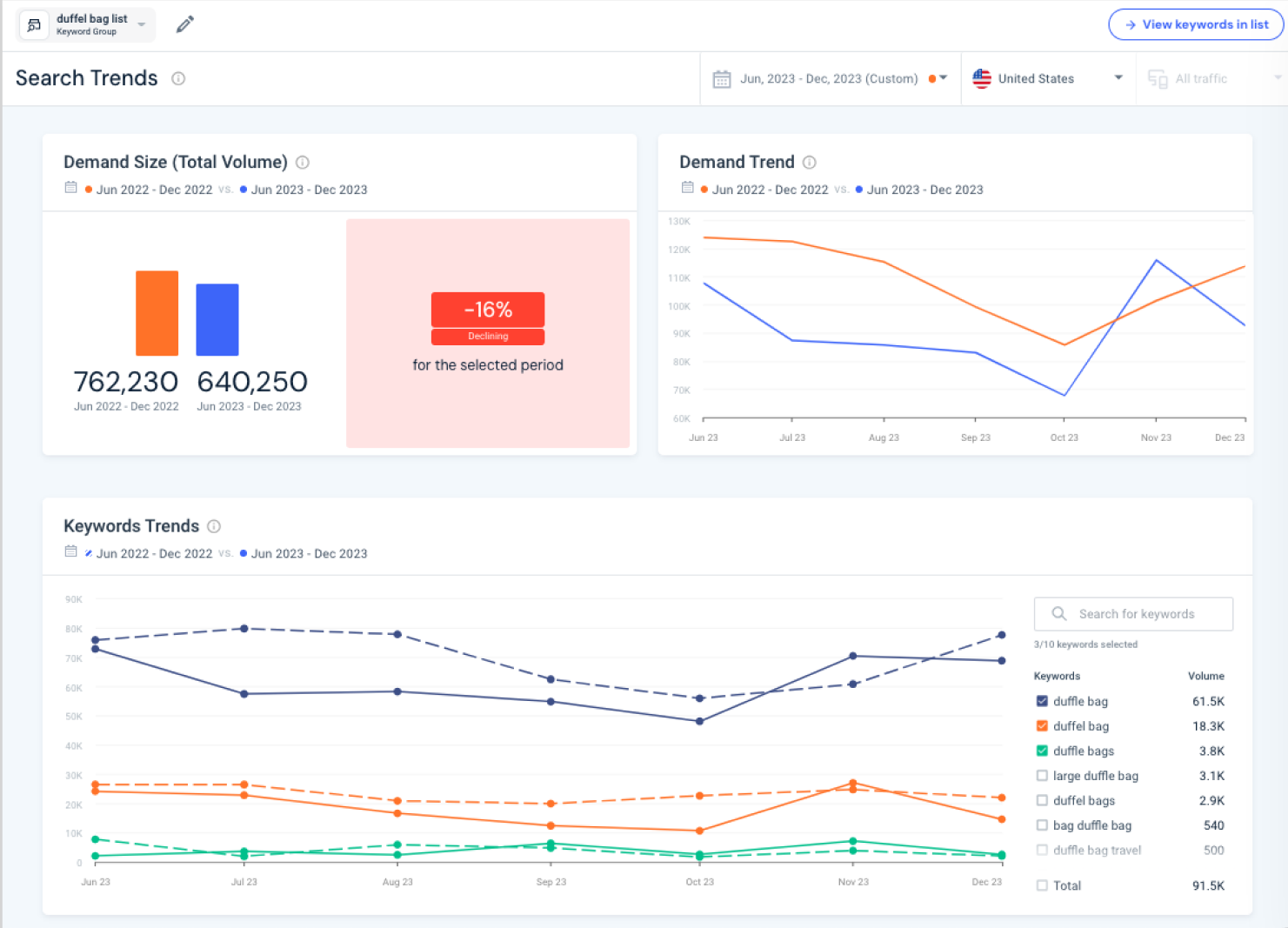
(Image Source: Similarweb)
For a deep dive into my competitors’ strategies, Similarweb is my go-to. This tool offers comprehensive insights into competitor website traffic, audience demographics, and engagement metrics.
I can see where their traffic is coming from, what keywords they’re ranking for, and even their top-performing pages. This level of detail helps me benchmark my own performance and identify new opportunities for growth.
The intuitive interface and robust data make it easy to stay ahead in a competitive landscape.
What You Will Like:
- Offers detailed analysis of website engagement, audience demographics, and retention.
- Allows tracking of industry trends and market share changes.
- Features keyword analysis for SEO and paid search strategies.
- Supports API access for integrating data into custom applications.
- Provides custom dashboards for monitoring specific metrics or competitors.
What You May Not Like:
- Can become costly as you scale up and require more detailed reports.
- Historical data is limited compared to some other market research tools.
Pricing: Start at $125 per month. Billed annually.
4. Glimpse : Best for Spotting Emerging Trends
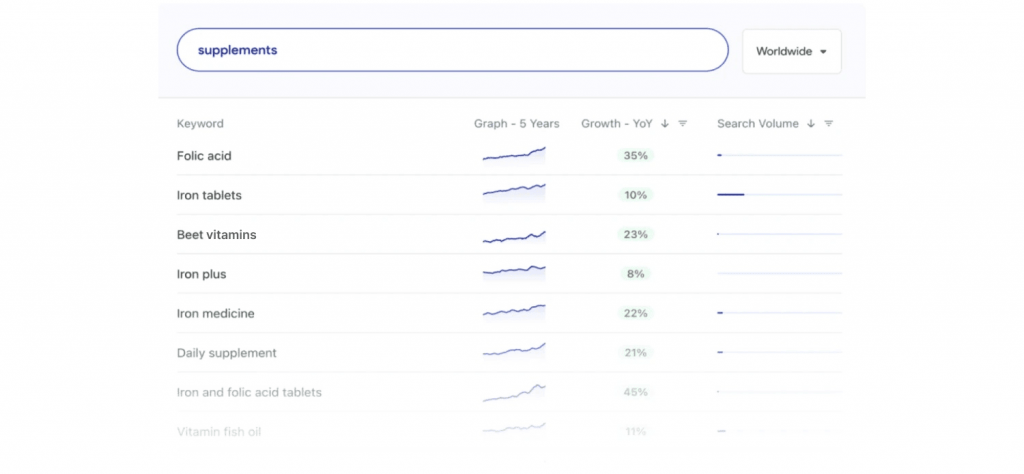
(Image Source: MeetGlimpse)
Staying ahead of the curve is crucial, and Glimpse is the perfect market research software for spotting emerging trends. This tool leverages data from Google Trends to highlight what’s gaining traction before it becomes mainstream. It detects and analyzes fast-growing trends based on social media and web data.
It’s like having a crystal ball for market trends. I find it incredibly useful for identifying new content ideas and product opportunities and understanding consumer behavior shifts. Glimpse’s timely insights have often given me a competitive edge in my projects.
What You Will Like:
- Delivers timely notifications about new trends relevant to your industry.
- Allows for quick exploration of niche markets with less competition.
- Offers insights into consumer behavior changes in real time.
- Integrates with e-commerce platforms to test product ideas quickly.
- Provides data-driven recommendations for marketing and product development.
What You May Not Like:
- Lacks the depth of data provided by more established market research tools.
- Mainly focuses on consumer goods and may not be as useful for B2B sectors.
Pricing: Custom pricing.
5. BuzzSumo: Best for Content Performance Analysis
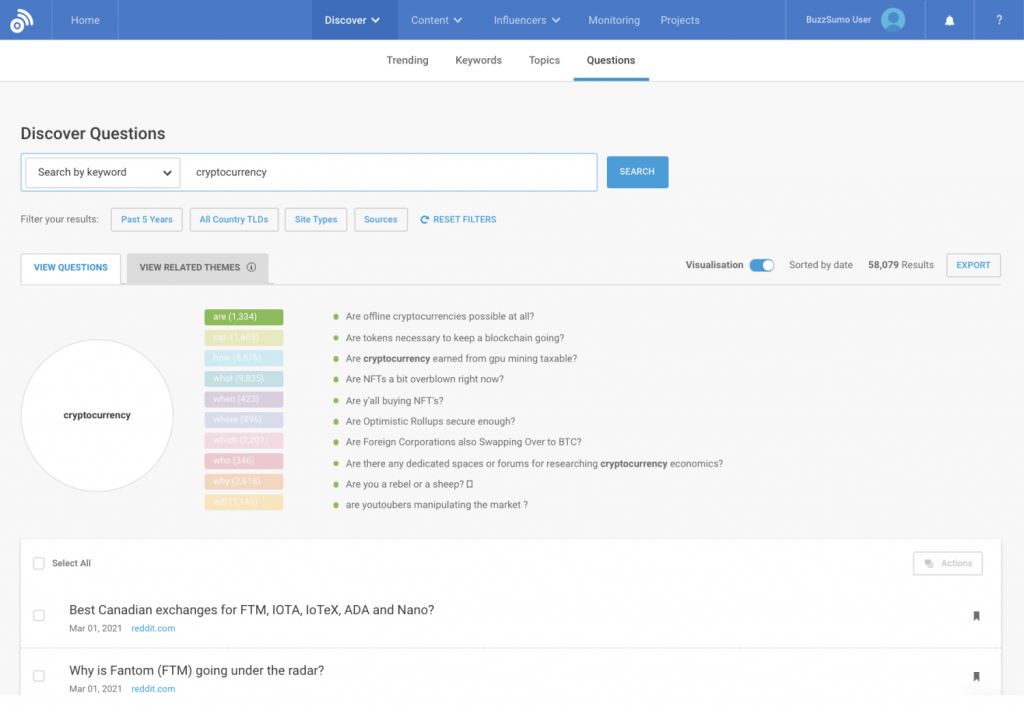
(Image Source: BuzzSumo)
BuzzSumo is indispensable for analyzing how well content performs. Whether I’m looking at my own content or that of my competitors, BuzzSumo helps me understand what resonates with audiences.
It provides data on social shares, backlinks, and even influencer engagement. This tool is particularly valuable for refining my content strategy, as it highlights the types of content that generate the most buzz.
With BuzzSumo, I can ensure my content efforts are always impactful and aligned with audience interests.
What You Will Like:
- Allows users to discover the most shared content across major social platforms.
- Offers insights into the performance of specific content types, lengths, and formats.
- Supports content research with filters by date, language, and region.
- Includes influencer identification to help boost your marketing efforts.
- Delivers detailed backlink data to understand who is linking to and promoting your content.
What You May Not Like:
- More focused on content performance, less on overall market trends.
- Some features, like historical data, are only available on higher-tier plans.
Pricing: Start at $159 per month. Billed annually.
6. AnswerThePublic : Best for Generating Content Ideas
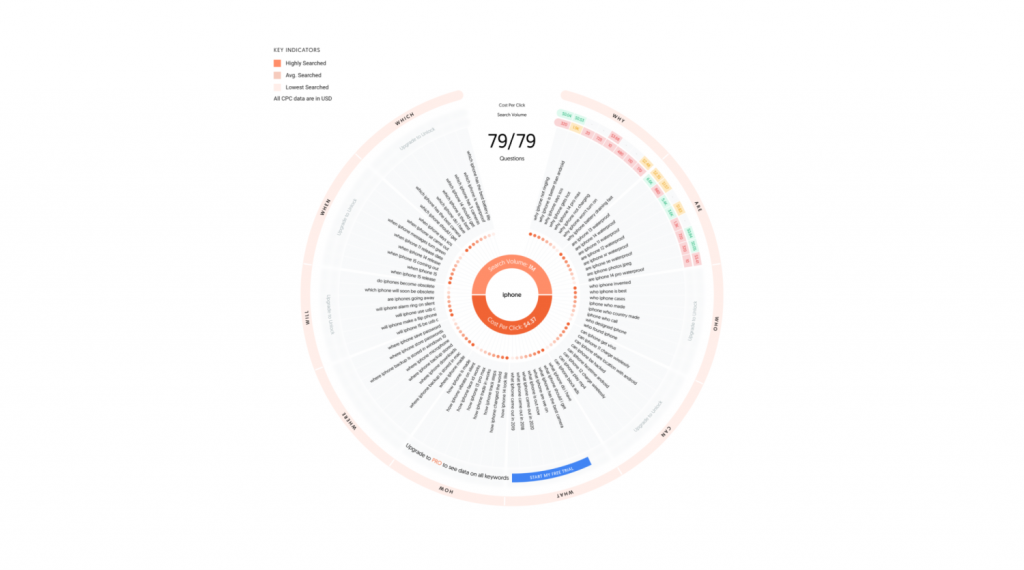
(Image Source: PageTrafficBuzz)
When I’m in need of fresh content ideas, AnswerThePublic is my secret weapon. This tool visualizes search queries from Google and Bing, showing what people are curious about. It’s like having a direct line to my audience’s minds.
I use it to brainstorm blog topics, video content, and even product descriptions. The way it organizes data into questions, prepositions, and comparisons makes it incredibly easy to pinpoint exactly what content will meet my audience’s needs.
What You Will Like:
- Provides visualizations of search questions and prepositions related to keywords.
- Helps identify consumer concerns and queries surrounding specific topics.
- Offers quick download options for data in CSV format.
- Supports data collection from various regions and languages to tailor content globally.
- Enables SEO and content marketing teams to create highly targeted content.
What You May Not Like:
- Focuses mainly on keyword-based queries, lacking broader market insights.
- Does not integrate with other marketing tools, requiring manual data management.
Pricing: Starts at $2.92 per month. Billed annually.
7. GrowthBar SEO : Best for Keyword Ranking Insights
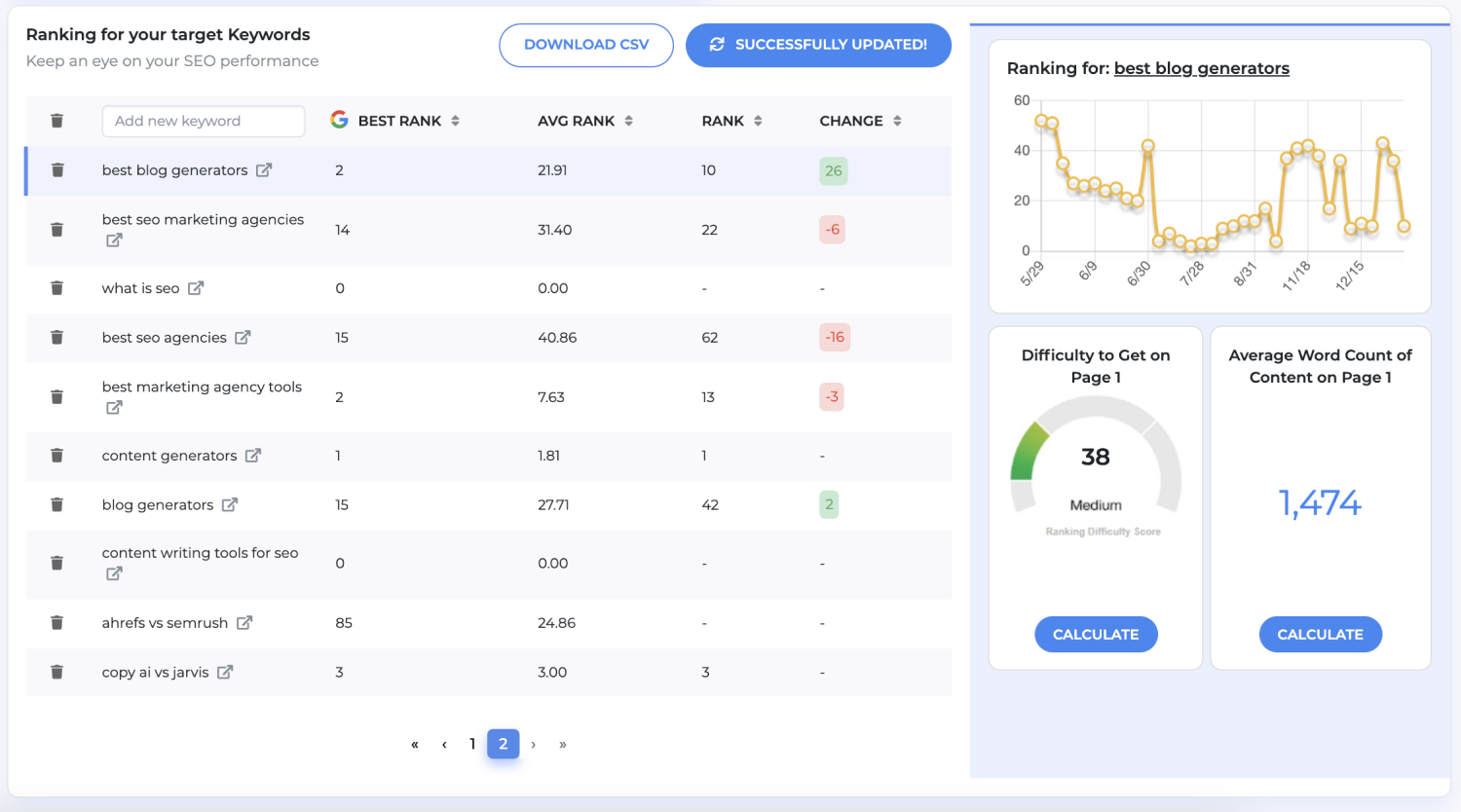
(Image Source: Growth Bar SEO)
For in-depth keyword ranking insights, GrowthBar SEO has been my tool of choice. It provides detailed keyword metrics, including search volume, CPC, and ranking difficulty, right within my browser.
I particularly appreciate its ability to generate keyword suggestions and content ideas based on what’s already ranking well. This makes optimizing my content for SEO a breeze, helping me climb the search engine rankings and drive more organic traffic to my site.
What You Will Like:
- Offers competitive analysis to see how your site stacks up against competitors.
- Includes a keyword research tool that suggests profitable keywords.
- Features a content outline generator to speed up content creation.
- Integrates with Google Analytics for a comprehensive view of your traffic.
- Offers a Chrome extension for instant SEO insights on any website you visit.
What You May Not Like:
- Primarily suitable for small to medium-sized businesses, might not scale well for very large sites.
- Some users report occasional inaccuracies in data reporting.
Pricing: Starts at $20.30 per month. Billed annually.
8. Statista: Best for Accessing Statistical Data
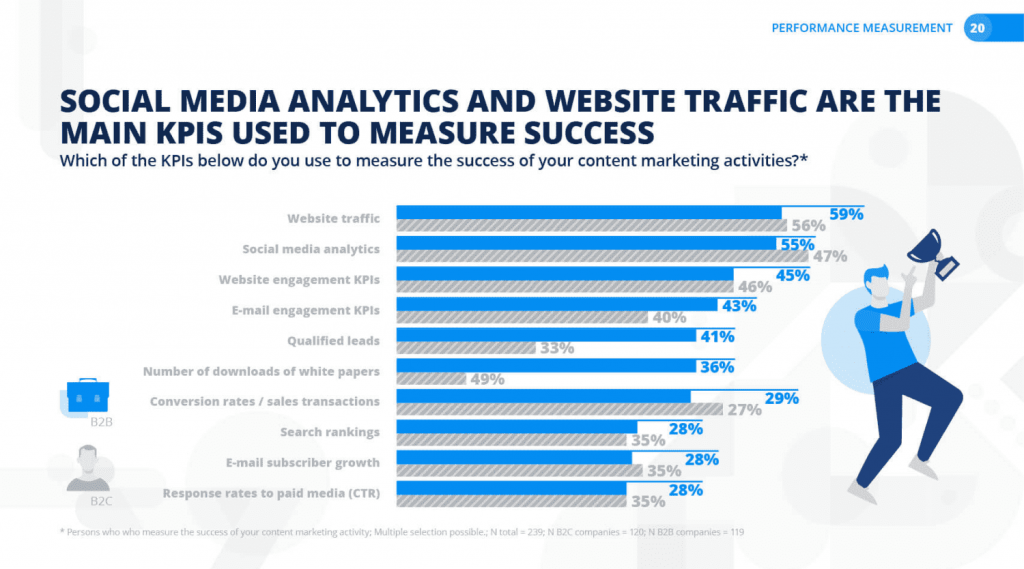
(Image Source: Statista)
Statista is a treasure trove of statistical data, covering a vast array of topics. Whenever I need reliable data to back up my market research or reports, Statista is where I turn.
It offers access to a vast database of statistics, forecasts, dossiers, and infographics from over 22,500 sources. The quality and depth of data available help me make informed decisions and provide compelling evidence in my presentations and content.
What You Will Like:
- Offers customizable charts and graphs to visualize data easily.
- Includes data on a wide range of topics and industries worldwide.
- It supports downloading statistics in various formats for presentations and reports.
- Provides insights into market forecasts, consumer markets, and company data.
- Delivers frequent updates to data, ensuring information is current and relevant.
What You May Not Like:
- Subscriptions can be expensive, particularly for full access to all features.
- Some niche industries or less popular topics may have less comprehensive data.
Pricing: Individual plan starts at $149 per month. Billed annually.
9. Think With Google: Best for Consumer Insights
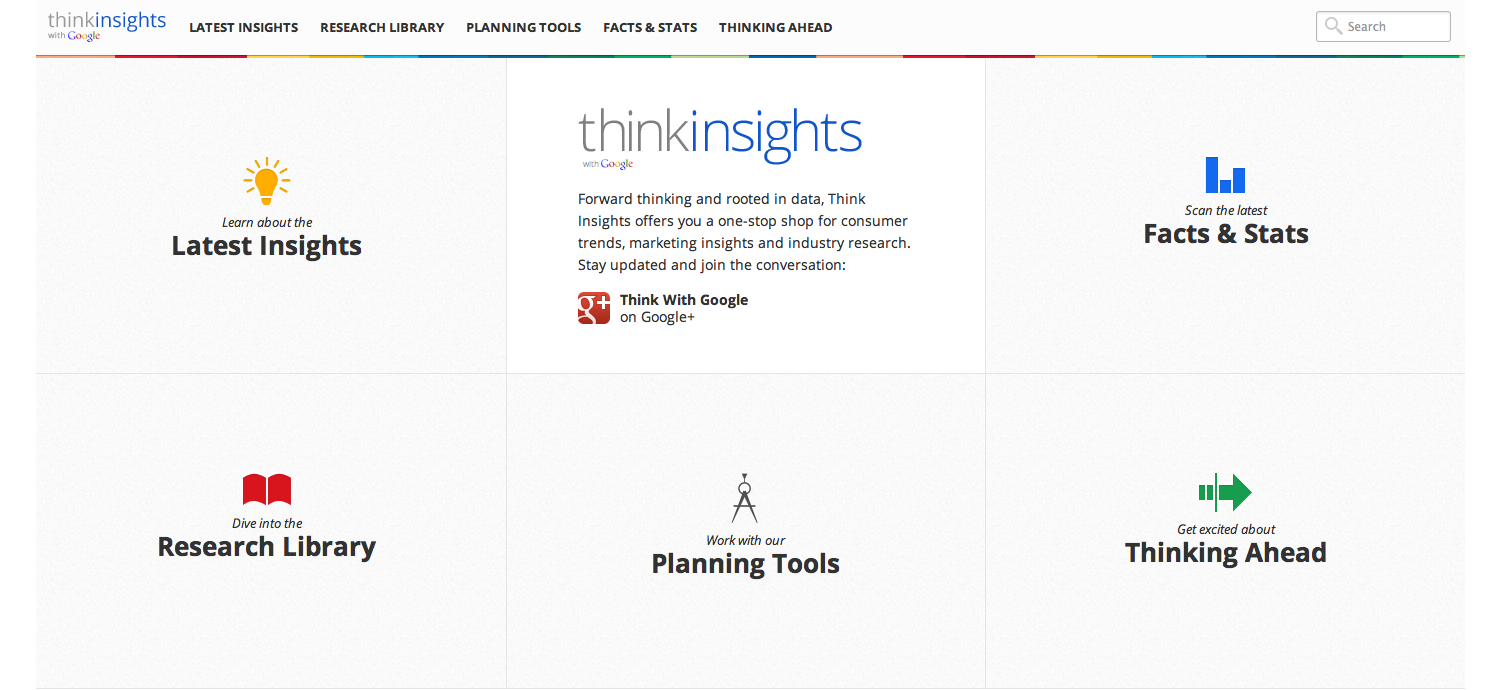
(Image Source: Blogspot)
Think With Google is my top resource for consumer insights. It offers a wealth of research, trends, and data-driven insights from Google’s vast repository. I use it to understand shifting consumer behaviors, explore new market opportunities, and refine my marketing strategies.
The case studies and reports are particularly useful, providing practical examples and actionable takeaways that I can apply directly to my work.
What You Will Like:
- Offers a range of tools to analyze consumer trends, ad performance, and website insights.
- Integrates with other Google services for a unified approach to market research.
- Provides real-time data that helps marketers adjust their strategies quickly.
- Features tools specifically designed for mobile market analysis.
- Delivers insights based on large-scale data sets that Google has access to.
What You May Not Like:
- Primarily focused on digital marketing, which may not cover all business needs.
- Data and tools are somewhat limited to the ecosystems of Google products.
Pricing: Free, but has limited survey features.
10. Google Keyword Tool: Best for Keyword Research
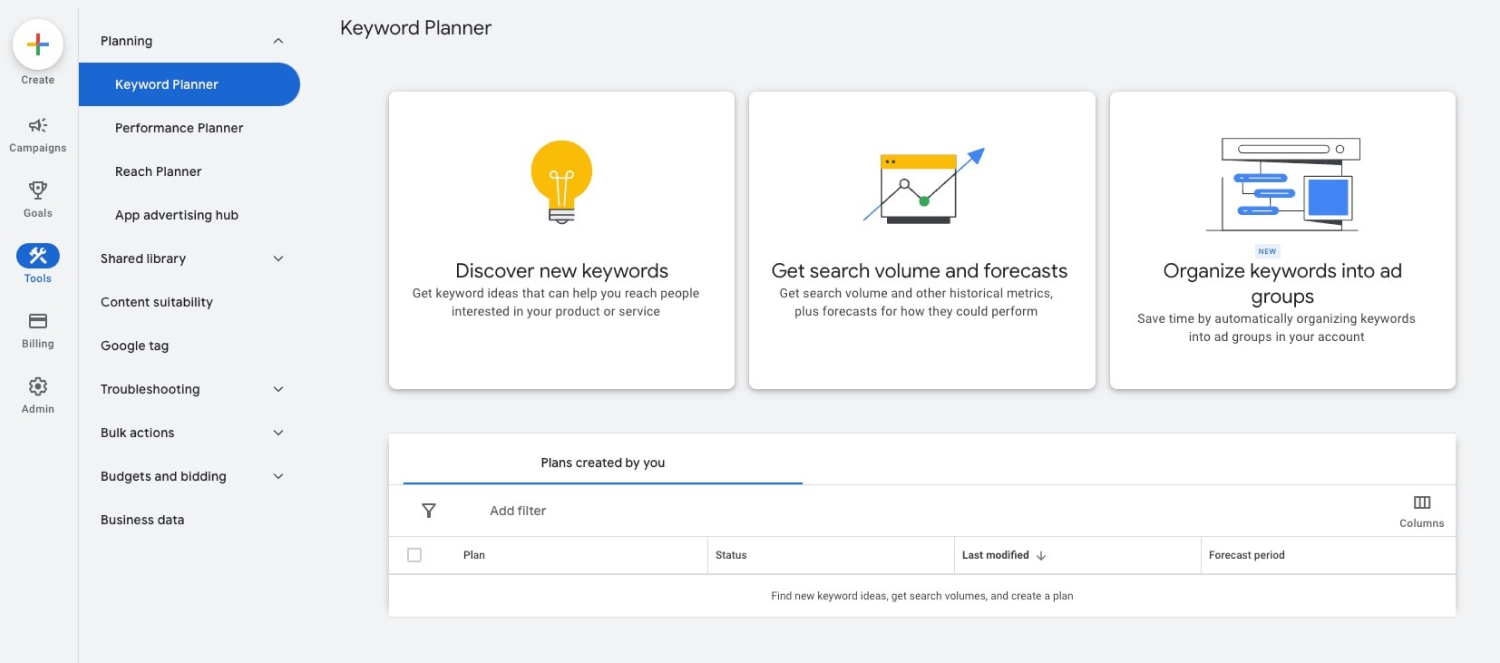
(Image Source: Backlinko)
For comprehensive keyword research, the Google Keyword Tool is indispensable. It offers detailed insights into keyword search volume, competition, and trends.
I use it to uncover new keyword opportunities and refine my SEO strategy. The tool’s integration with Google Ads also helps me plan and optimize my PPC campaigns, ensuring I target the right keywords for maximum impact.
What You Will Like:
- Offers extensive data on search volume, competition, and trends for keywords.
- Supports filtering by location, language, and search network.
- Helps in identifying long-tail keywords for niche marketing efforts.
- Provides historical data trends for better understanding seasonal variations in keyword popularity.
- Allows for the export of keywords and data for further analysis.
What You May Not Like:
- Mainly useful for users with active Google Ads accounts.
- It focuses on PPC data, which may not always translate directly into organic search insights.
Pricing: Free to use, but comes coupled with Google Ads.
11. Tableau: Best for Data Visualization
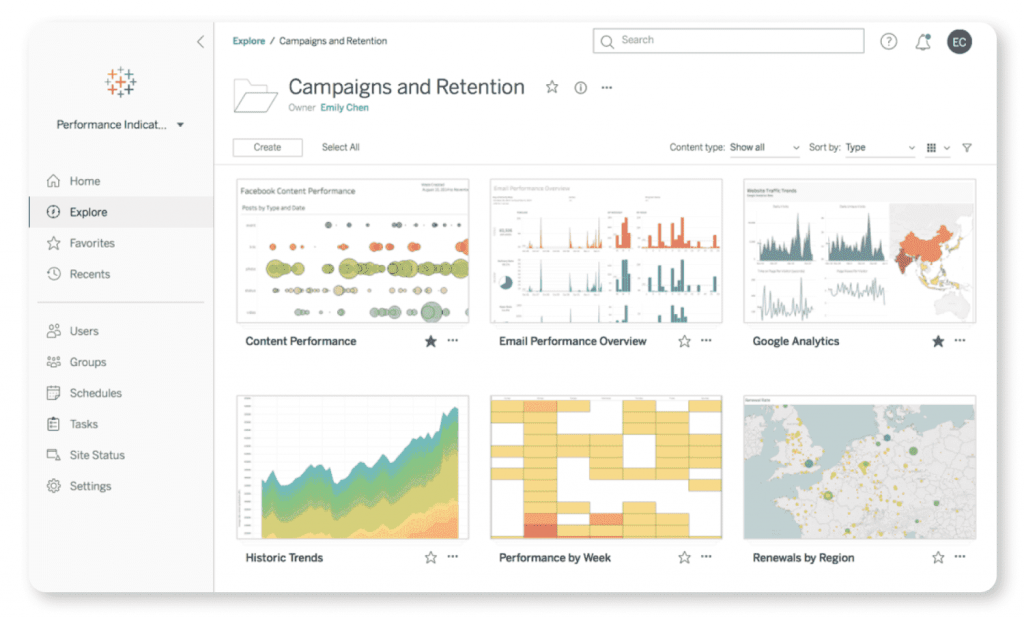
(Image Source: Tableau)
When it comes to data visualization, Tableau Software is in a league of its own. It transforms complex data sets into intuitive, interactive visualizations. I use Tableau to create dashboards that provide clear, actionable insights at a glance.
Its ability to connect to various data sources and perform advanced analytics makes it a powerful tool for both reporting and strategic planning. The visual appeal and clarity Tableau brings to data help me communicate insights effectively across teams.
What You Will Like:
- Supports integration with a wide array of data sources, including big data and cloud databases.
- Features drag-and-drop functionality for creating interactive dashboards.
- Allows for real-time data updates, enabling dynamic and up-to-date visualizations.
- Provides robust security features for managing access and data integrity.
- Supports mobile access, allowing users to view and interact with dashboards on the go.
What You May Not Like:
- Has a steep learning curve to utilize its advanced features fully.
- Requires significant system resources for optimal performance.
Pricing: Starts at $12 per user per month.
12. Typeform: Best for Lead Qualification Surveys
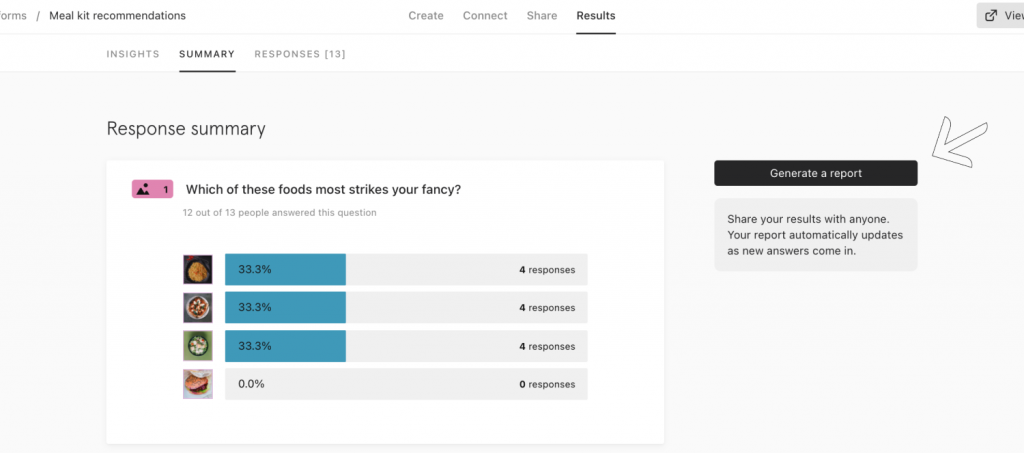
(Image Source: Zendesk)
Typeform is my preferred tool for lead qualification surveys. Its engaging, conversational format makes it easy to collect detailed information from prospects. I love how customizable and user-friendly Typeform is, allowing me to create surveys that are not only effective but also enjoyable for respondents.
The data I gather through Typeform helps me qualify leads more accurately, ensuring my sales efforts are focused on the most promising opportunities
What You Will Like:
- Provides a wide range of customization options to match brand identity.
Supports logic jumps that tailor questions based on previous answers. - Integrates with major marketing and CRM platforms such as HubSpot, Salesforce, and MailChimp to enhance marketing functionality.
- It delivers robust data collection and analysis tools so that you can analyze the collected information.
- Offers templates for quick setup of surveys, quizzes, and forms.
What You May Not Like:
- Limited options for more complex survey requirements or data processing.
- Users may experience limitations in exporting data in certain formats.
Pricing: Start at $25 per month. Billed annually.
13. Qualtrics: Best for Enterprise-Level Surveys With Advanced Features
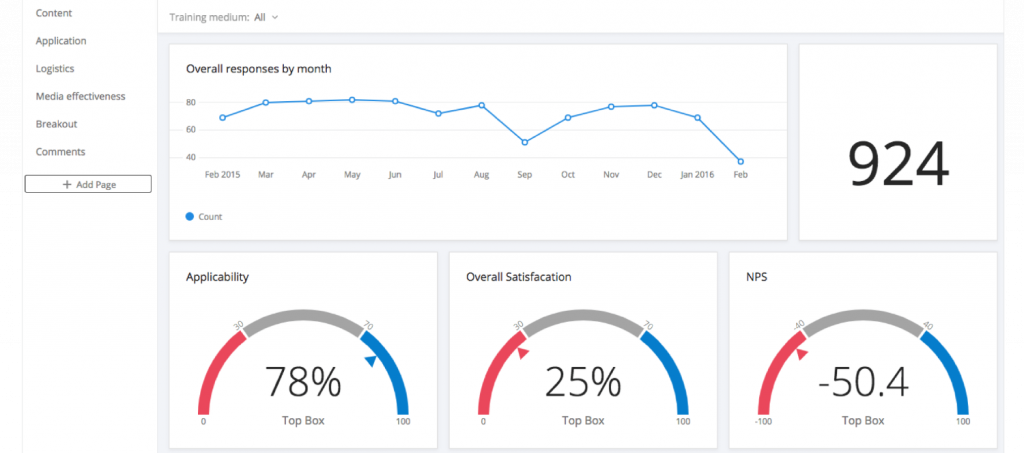
(Image Source: Appvizer)
For enterprise-level surveys, Qualtrics is unmatched. It offers advanced features like custom survey flows, extensive question types, and powerful analytics.
I used Qualtrics for large-scale research projects, where the ability to segment data and perform complex analyses is crucial. Its robust platform supports everything from customer satisfaction surveys to employee feedback, making it a versatile tool for any organization.
What You Will Like:
- Features powerful data analysis tools, including predictive intelligence and trend insights.
- Supports advanced user management and collaboration features.
- Provides extensive security and compliance measures that are suitable for large enterprises.
- Allows for in-depth customization of surveys to fit exact research needs.
- Offers automated actions based on survey responses to enhance respondent engagement.
What You May Not Like:
- Some features require advanced knowledge of research methodologies.
- Customization and setup can be time-consuming for complex surveys.
Pricing: Custom pricing.
14. Userlytics : Best for User Experience Testing
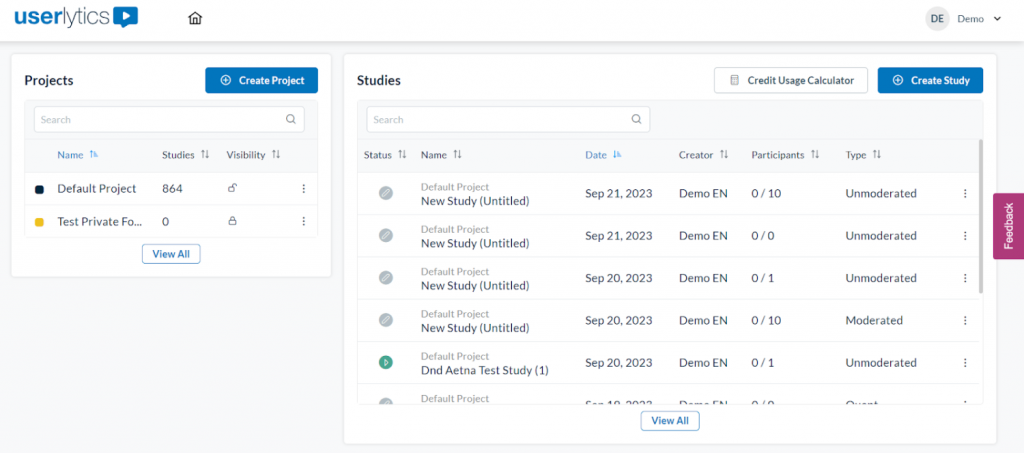
(Image Source: Zendesk)
Userlytics is essential for user experience testing. It allows you to conduct remote usability tests with real users, providing valuable insights into how they interact with my website or app.
The video recordings and detailed metrics help you identify pain points and optimize the user journey. Userlytics’ flexibility and depth of insights make it a critical component of my UX research toolkit.
What You Will Like:
- Offers features for testing websites, apps, and prototypes for a better view of user experience.
- Supports a variety of testing methods, including card sorting and tree testing.
- Includes built-in analytics for assessing user interaction and satisfaction.
- Allows for the recording of user sessions for in-depth analysis.
- Provides actionable insights to improve user experience and interface design.
What You May Not Like:
- More focused on user experience testing, less on broader market research.
- The platform can be complex to navigate for those new to usability testing.
Pricing: Starts at $34 per month. Billed annually.
15 .Upwave (Formerly Survata): Best for Brand Lift Studies
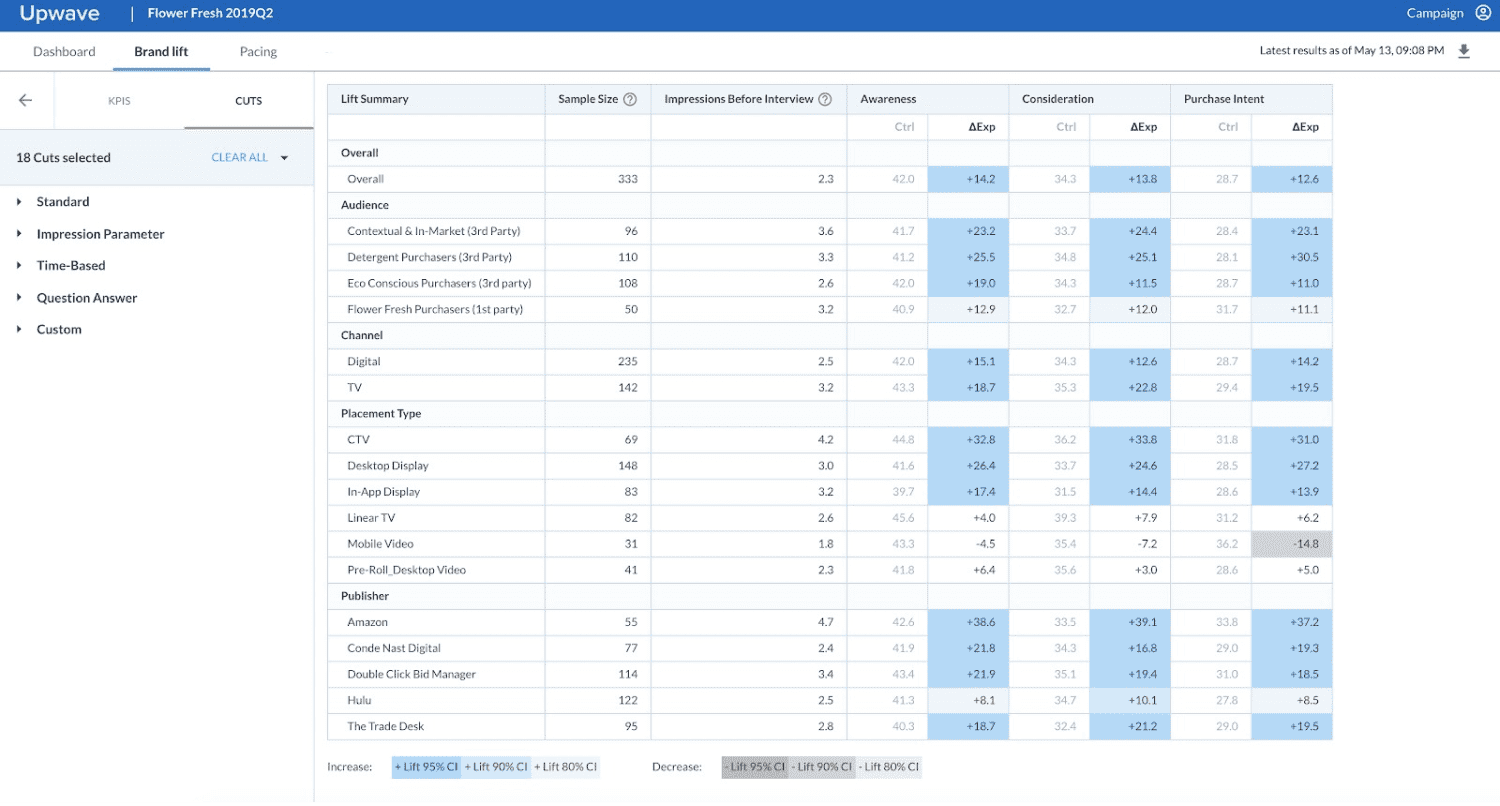
(Image Source: Upwave)
Upwave is my go-to for brand lift studies. It measures the impact of advertising campaigns on brand perception, providing clear insights into their effectiveness.
I rely on Upwave to assess how well my campaigns are resonating with the target audience and to fine-tune my strategies for better results. The detailed reports and actionable data it provides are invaluable for demonstrating ROI and optimizing future campaigns.
What You Will Like:
- It features real-time campaign analytics for quick decision-making.
- Supports extensive survey targeting options to reach the right audience.
- Provides a straightforward interface for setting up and managing surveys.
- Delivers insights into consumer sentiment and brand perception.
- Uses a proprietary network for data collection to ensure quality responses.
What You May Not Like:
- Limited in terms of custom survey design compared to more focused survey platforms.
- Data reporting can be too simplistic for very detailed analytical needs.
Pricing: Starts at $2/participant.
16. Make My Persona: Best for Creating Detailed Buyer Personas
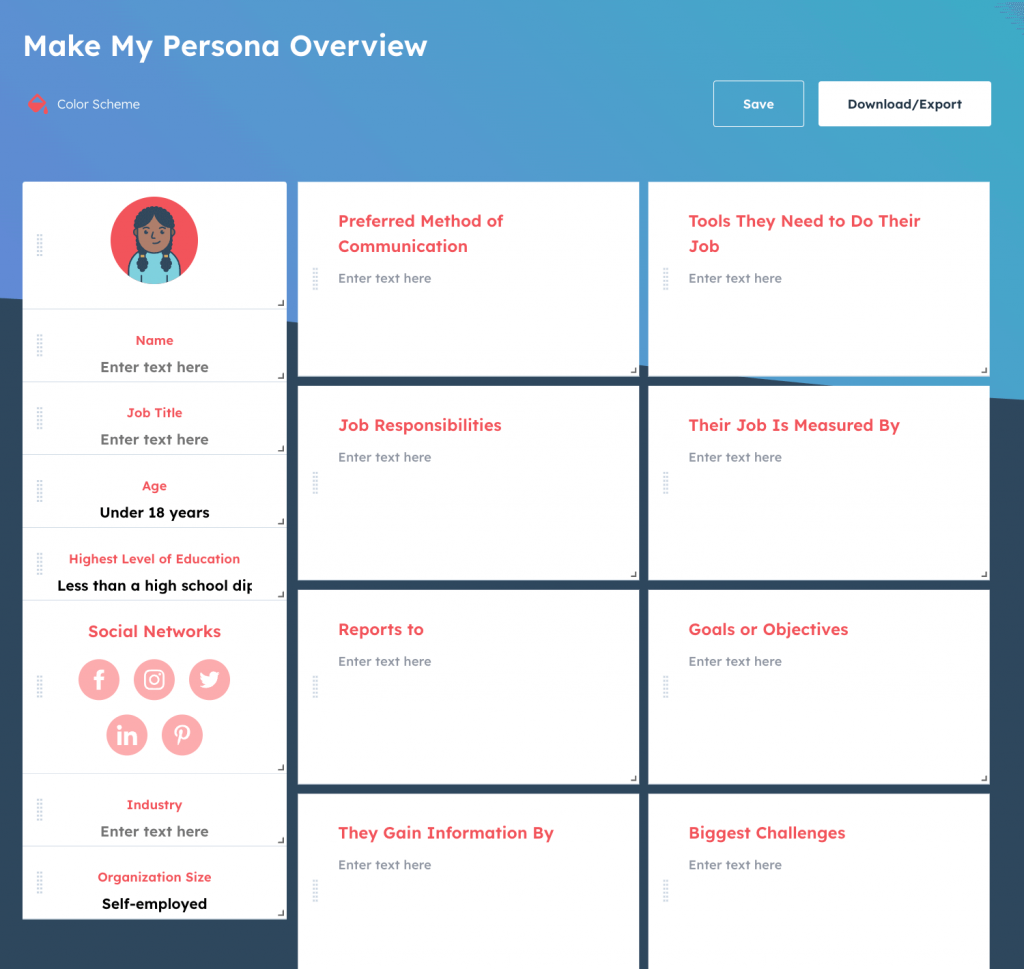
(Image Source: Optinmonster)
Creating detailed buyer personas is a breeze with Make My Persona. I used this quite a lot in the past, and it helped me understand what potential customers are searching for and their common questions and concerns.
By visualizing search data, the tool enables you to craft comprehensive personas that accurately reflect your target audience’s needs and preferences. These insights are crucial for tailoring your marketing strategies and ensuring my messaging resonates with the right people.
What You Will Like:
- Provides step-by-step guidance through the persona-building process.
- Includes templates to start and refine personas quickly.
- Helps you understand your target audience better with detailed insights.
- Supports the creation of multiple personas for different market segments.
- Delivers a user-friendly interface that’s accessible to all team members.
What You May Not Like:
- Features can be too basic for more advanced marketing teams.
- Limited customization options for the templates provided.
Pricing: Free to use with limited market research features.
Evaluation Criteria
The evaluation of products or tools chosen for this article follows an unbiased, systematic approach that ensures a fair, insightful, and well-rounded review. This method employs six key factors:
- User Reviews / Ratings: Direct experiences from users, including ratings and feedback from reputable sites, provide a ground-level perspective. This feedback is critical in understanding overall satisfaction and potential problems.
- Essential Features & Functionality: The value of a product is ascertained by its core features and overall functionality. Through an in-depth exploration of these aspects, the practical usefulness and effectiveness of the tools are carefully evaluated.
- Ease of Use: The user-friendliness of a product or service is assessed, focusing on the design, interface, and navigation. This ensures a positive experience for users of all levels of expertise.
- Customer Support: The quality of customer support is examined, taking into account its efficiency and how well it supports users in different phases – setting up, addressing concerns, and resolving operational issues.
- Value for Money: Value for money is evaluated by comparing the quality, performance, and features. The goal is to help the reader understand whether they would be getting their money’s worth.
- Personal Experience / Experts’ Opinions: This part of the evaluation criteria draws insightful observations from the personal experience of the writer and the opinions of industry experts.
What Is Market Research?
What is Customer Feedback & How to Use User Research Software
Market research is the process of gathering, analyzing, and interpreting information about a market, including data on target customers, competitors, and industry trends. It helps businesses understand consumer needs and preferences, guiding product development and marketing strategies.
For example, a company planning to launch a new fitness app might conduct surveys and focus groups to determine the features potential users value most.
Read: Survey Teardowns: How Gold’s Gym Gathers User Feedback Via Email | Blog
According to a LinkedIn report, a lot of companies use market research to gain a competitive advantage, highlighting its importance in strategic decision-making and business growth.
What Are the Market Research Tools Used For?
Market research tools are essential for gathering, analyzing, and interpreting data related to market conditions, customer behavior, and competitive landscapes. They serve various purposes, including:
1.Understanding Customer Needs and Preferences
These tools help businesses collect data on customer preferences, buying habits, and satisfaction levels. This information is crucial for developing products and services that meet customer expectations.
Nudge.png
2. Identifying Market Trends
Market research survey platforms can track and analyze trends within an industry, helping companies stay ahead of the competition by adapting to changes in market conditions.
3. Competitor Analysis
Businesses use these tools to monitor competitor activities, strengths, weaknesses, and strategies. This helps in benchmarking and developing strategies to gain a competitive edge.

4. Measuring Marketing Effectiveness
Tools for market research can assess the effectiveness of marketing campaigns by tracking metrics such as customer engagement, conversion rates, and return on investment (ROI).
5. Segmenting Markets
Market research tools assist in dividing the market into distinct segments based on demographics, psychographics, and behavior. This allows for more targeted marketing and product development efforts.
6. Forecasting Sales and Market Potential
These tools provide data and analytical capabilities to forecast future sales, helping businesses in planning and budgeting.
7. Product Development and Innovation
By understanding customer needs and market gaps, businesses can use market research tools to guide product development and innovation, ensuring that new products meet market demand.
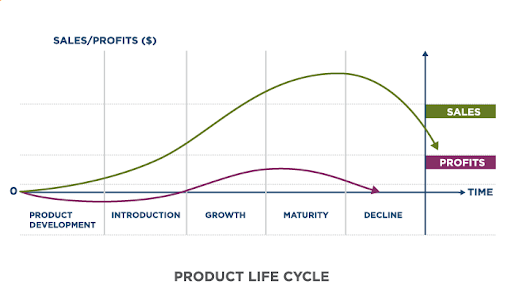
8. Identifying Opportunities and Threats
SWOT analysis tools help businesses identify internal strengths and weaknesses, as well as external opportunities and threats, enabling better strategic planning.
Using these tools effectively allows businesses to make informed decisions, tailor their marketing strategies, and ultimately achieve better outcomes in their respective markets.
Who Uses Market Research Tools?
Market research tools are used by a wide range of professionals and organizations to gather and analyze data about markets, customers, and competitors.
Here are some of the key users:
1. Marketing Professionals: They use market research tools to understand market trends, customer preferences, and the effectiveness of marketing campaigns. By analyzing data, they can tailor their strategies to reach better and engage their target audience, ultimately driving more successful marketing efforts.
2. Business Owners and Entrepreneurs: These individuals leverage market research tools to identify new market opportunities, assess competition, and make informed decisions about product development and business strategies. This helps them stay competitive and adapt to changing market conditions.
3.Product Managers: Product managers use these tools to gather customer needs and preferences insights. This information is crucial in guiding the development and improvement of products, ensuring they meet market demands and customer expectations
4. Sales Teams: Sales professionals utilize market research to identify potential customers and understand their needs. This knowledge allows them to tailor their sales strategies, improve customer targeting, and increase their chances of closing deals.
5.Consultants and Market Analysts: These experts use market research tools to provide data-driven insights and recommendations to their clients. They analyze market trends, consumer behavior, and competitive landscapes to help businesses make informed decisions.
6. Researchers and Academics: In the academic and research fields, professionals use market research tools to conduct studies and publish findings on various market dynamics and consumer behavior. These market research surveys contribute to a broader understanding of market trends and influence industry practices.
7. Customer Experience Managers: These managers rely on market research to understand customer feedback and improve overall customer satisfaction. By analyzing data on customer interactions and experiences, they can implement changes that enhance the customer journey.
8. Investors and Financial Analysts: Investors and analysts use market research tools to assess the viability of investments and understand market conditions. This information helps them make informed decisions about where to allocate resources and identify potential risks and opportunities.
9. Human Resources Professionals: HR professionals use market research to gauge employee satisfaction and organizational culture. Internal surveys and research help them identify areas for improvement and implement strategies to enhance the workplace environment.
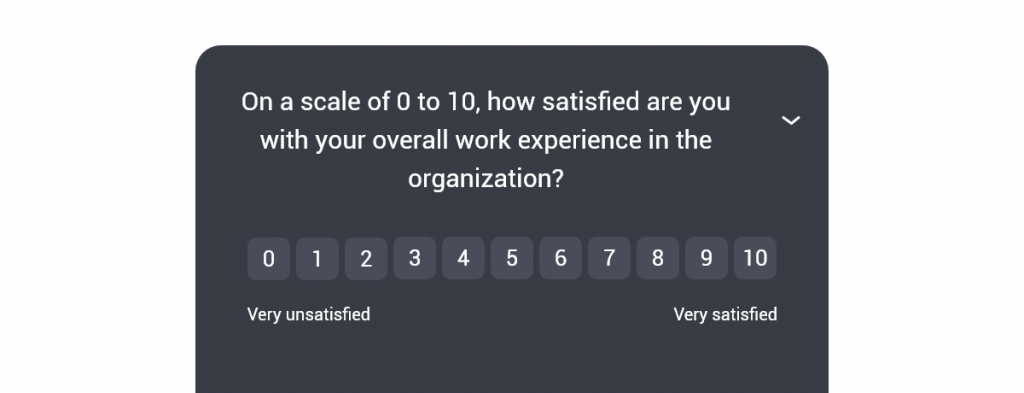
10. Nonprofit Organizations: Nonprofits use market research tools to understand the needs of their target beneficiaries and the impact of their programs. This information is essential for designing effective interventions and demonstrating their value to stakeholders and donors.
Each of these users leverages market research tools to gather both quantitative and qualitative data, enabling them to make more informed and strategic decisions in their respective fields.
Read More: 6 Inventive Uses For Qualaroo | Blog
What Are the Major Features of Market Research Tools?
Market research tools offer a wide array of features to help businesses gather, analyze, and interpret data to make informed decisions. Here are some of the major features found in these tools:
- Survey Creation and Distribution:
- Customizable Templates: Pre-built templates for various types of surveys.
- Question Types: Multiple choice, open-ended, Likert scale, and more.
- Logic Branching: Direct respondents to different questions based on their previous answers.
- Multi-Channel Distribution: Send surveys via email, social media, or embed them on websites.
2. Data Collection and Management:
- Real-Time Data Collection: Immediate data capture as respondents complete surveys.
- Database Integration: Import and export data from other systems and databases.
- Data Anonymization: Ensure respondent anonymity for sensitive surveys.
3. Analytics and Reporting:
- Data Visualization: Graphs, charts, and dashboards for easy data interpretation.
- Cross-Tabulation: Compare different variables to find correlations and trends.
- Text Analysis: Analyze open-ended responses for sentiment and keyword trends.
- Statistical Analysis: Advanced statistical tools for deeper data insights.
Read: Data Storytelling: How To Tell A Great Story With Survey Data
4. Panel Management:
- Panel Recruitment: Tools for recruiting and managing survey participants.
- Demographic Filtering: Target specific demographics for more relevant insights.
- Incentive Management: Manage rewards for survey participation.
5. Market Segmentation:
- Cluster Analysis: Group respondents based on similarities in their responses.
- Persona Development: Create detailed profiles of different customer segments.
6. Competitive Analysis:
Benchmarking: Compare your data with industry standards or competitors.
SWOT Analysis: Identify strengths, weaknesses, opportunities, and threats.
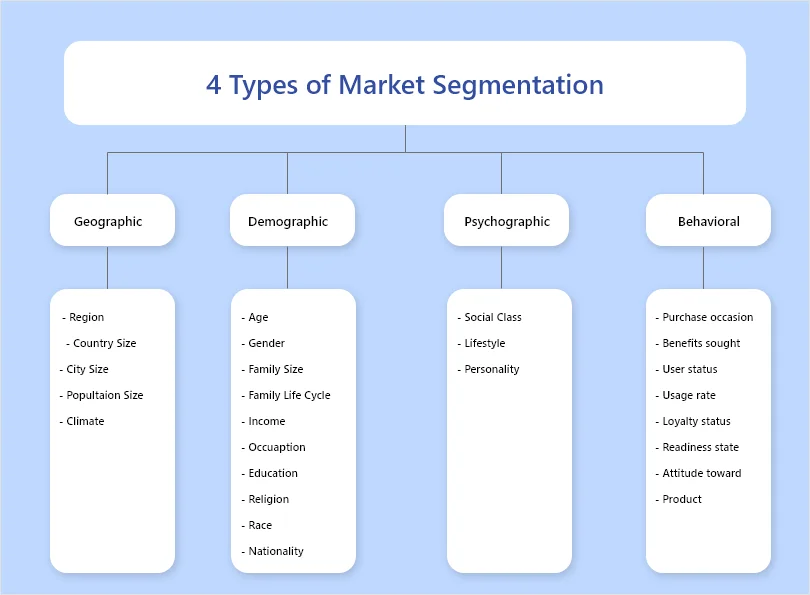
7. Trend Analysis:
- Historical Data Comparison: Analyze how responses change over time.
- Predictive Analytics: Use historical data to forecast future trends.
8. Collaboration and Sharing:
- Team Collaboration: Share surveys and results with team members.
- Role-Based Access: Control who can view and edit surveys and data.
9. Mobile Accessibility:
- Responsive Design: Surveys and dashboards accessible on mobile devices.
- Mobile App Integration: Dedicated apps for data collection and analysis on the go.
10. Integration Capabilities:
- API Access: Connect with other software tools and platforms.
- Third-Party Integrations: Integration with CRM, email marketing, and other tools.
- These features enable businesses to conduct thorough market research, gain valuable insights, and make data-driven decisions effectively.
What Are the Benefits of Market Research Tools?
Some of the major benefits of market research tools are as follows:
- Improved Marketing Strategies: By providing a deep understanding of the market and target audience, market research tools help businesses to create more effective marketing campaigns that resonate with their audience.
- Product Development: Insights from market research tools can guide the development of new products or the improvement of existing ones. This ensures that products meet the needs and preferences of the target market.
- Customer Satisfaction: Regular use of market research tools helps businesses stay in tune with their customers’ changing needs and preferences, leading to higher customer satisfaction and loyalty.
- Cost Efficiency: By identifying the most promising markets and customer segments, market research tools help businesses allocate their resources more efficiently, reducing waste and increasing ROI.
- Risk Mitigation: Understanding market dynamics and customer sentiments helps businesses anticipate potential challenges and risks, allowing them to develop strategies to mitigate these risks.
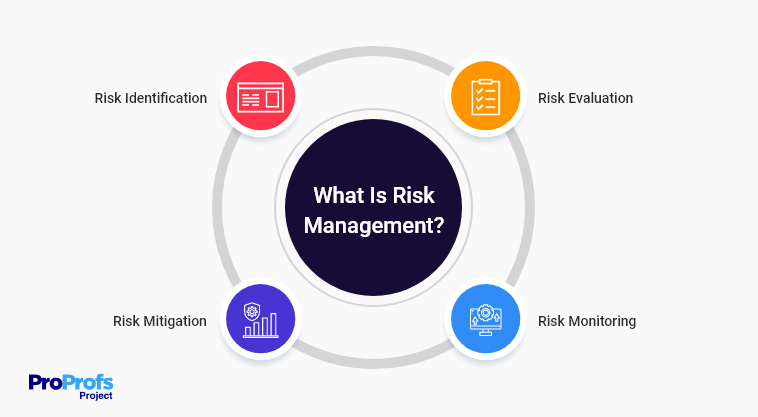
- Competitive Advantage: Businesses that effectively utilize market research tools are better positioned to understand their market environment, adapt to changes, and stay ahead of the competition.
- Strategic Planning: Market research tools provide the data needed for long-term strategic planning. This ensures that business strategies are aligned with market realities and future trends.
Thus, market research tools are essential for businesses aiming to thrive in a competitive environment. They provide the insights needed to understand the market, make informed decisions, and develop strategies that lead to business growth and success.
How to Choose the Right Market Research Tool
Picking the right market research tool is crucial for gathering insightful data that can drive strategic decisions. Here’s a guide to help you select the best market research tool for your needs:
- Identify Your Research Objectives
- Purpose: Determine whether you need qualitative insights, quantitative data, or both.
- Scope: Understand the scale of your research – is it for a small internal project or a large-scale study?
Pro Tip: Clearly define your research objectives at the outset to narrow down tools that specialize in your specific needs, ensuring a more tailored approach.
Also Read: Qualitative vs. Quantitative Research: How to Get the Best of Both Worlds
2. Assess Features and Capabilities
- Data Collection Methods: Look for tools that offer various methods like surveys, focus groups, interviews, and social media analysis.
- Customization: Ensure the tool allows you to customize surveys and questionnaires to suit your specific needs.
- Reporting and Analytics: Check for robust analytics and reporting features that can help you interpret data effectively.
- Integration: Consider if the tool integrates well with other software you use, such as CRM or data visualization tools.
Pro Tip: Prioritize tools with advanced analytics and integration capabilities to maximize the utility of your collected data.
3. Insist on Ease of Use
- User Interface: The tool should have an intuitive and user-friendly interface.
- Learning Curve: Evaluate how easy it is for your team to learn and use the tool efficiently.
Pro Tip: Opt for tools with free training resources and a supportive community to accelerate your team’s proficiency.
4. Ensure Data Security and Compliance
- Privacy: Ensure the tool complies with data protection regulations such as GDPR, CCPA, etc.
- Security: Look for features like data encryption and secure storage to protect sensitive information.
Pro Tip: Always verify the tool’s compliance with the latest regulations to avoid legal complications and ensure data integrity.
5. Consider Cost and ROI
- Budget: Compare the pricing plans of different tools and see what fits your budget.
- Value for Money: Assess whether the features offered justify the cost. Sometimes, a higher-priced tool may offer better ROI in terms of functionality and insights.
Pro Tip: Consider the long-term benefits and potential cost savings of investing in a higher-priced tool that offers comprehensive features.
6. Check Customer Support and Resources
- Support: Check the availability and quality of customer support. This includes live chat, email, phone support, and help centers.
- Training and Resources: Look for tools that provide comprehensive training materials, webinars, and documentation.
Pro Tip: Select tools with responsive customer support to ensure quick resolution of any issues and uninterrupted research activities.
7. Read Reviews and Testimonials
- User Reviews: Read reviews from other users to understand the strengths and weaknesses of the tool.
- Case Studies: Look for case studies to see how the tool has been used effectively by other businesses.
- Pro Tip: Pay attention to detailed reviews that highlight specific use cases similar to your needs to gauge the tool’s real-world performance.
8. Go for Trial and Evaluation
Free Trial: Take advantage of free trials or demo versions to test the tool before making a purchase.
Pilot Testing: Conduct a pilot study to see if the tool meets your requirements and integrates well with your workflow.
Pro Tip: Use the trial period to thoroughly test all features and involve your team in the evaluation to get diverse feedback.
10. Check Scalability
- Ensure the tool can scale with your business needs and handle an increasing volume of data and complexity of research over time.
Pro Tip: Choose a scalable tool to avoid the hassle of switching platforms as your research grows, ensuring consistency and long-term cost efficiency.
By carefully evaluating these factors, you can select a market research tool that aligns with your objectives, budget, and technical requirements, ensuring you gather actionable insights for your business.
Also Read: What Is Customer Feedback Software and How to Choose the Best One | Blog
What are the Budget Considerations When Picking a Market Research Tool?
Budget considerations are crucial when selecting a market research tool to ensure you get the best value for your investment. Start by assessing the initial costs, including software purchase or subscription fees and licensing. Subscription models might offer flexibility but often entail recurring charges. Besides, factor in ongoing costs such as maintenance, support, and training, which can add up over time.
Consider additional features and upgrades that might incur extra costs. Some tools offer basic functionality at a lower price but charge more for advanced features and integrations.
Finally, ensure value for money by comparing features within your budget range and reviewing user feedback. Carefully scrutinize contract terms for any hidden costs, leveraging free trials or demos when available.
Case Studies
1. The Lenovo Story
2. The Hootsuite Story
Unlock the Power of Market Research Tools for Strategic Growth
Market research tools are essential for any business looking to achieve strategic growth. They provide valuable insights into customer behavior, market trends, and competitive analysis. By leveraging these tools, companies can make data-driven decisions, improve customer satisfaction, and stay ahead of the competition.
After using several tools for marketing research and surveys, I found Qualaroo really good in this aspect. With its advanced targeting, customizable surveys, and actionable analytics, it helps businesses gather deep insights efficiently, making it a top choice for enhancing strategic decision-making and fostering growth.
FREE. All Features. FOREVER!
Try our Forever FREE account with all premium features!

